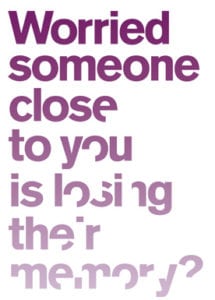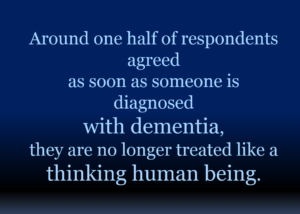Each of us has elderly family members for whom we may be concerned about their memory or other possible signs of dementia. You don’t have to stand by powerless and let them dwindle away. Early detection of dementia gives the best chance for a higher quality during the rest of one’s life. Isn’t that how we’d all want our loved ones to spend their golden days? This
Straight, No Chaser post adapts information provided by the Alzheimer’s Association. Any positive responses can suggest an issue warranting further investigation. The goal here is straightforward. If any concerns arises after completing this, you should print out the sheet, and take it to your physician, requesting an evaluation.

_____ 1.
Memory loss that disrupts daily life. One of the most common signs of Alzheimer’s, especially in the early stages, is forgetting recently learned information. Other signs include forgetting important dates or events; asking for the same information over and over; relying on memory aids (e.g., reminder notes or electronic devices) or family members for things they used to handle on their own. Typical age-related changes involve sometimes forgetting names or appointments, especially if you remember them later.
_____ 2.
Challenges in planning or solving problems. Some people may experience changes in their ability to develop and follow a plan or work with numbers. They may have trouble following a familiar recipe or keeping track of monthly bills. They may have difficulty concentrating and take much longer to do things than they did before. Typical age-related changes include making an occasional error when balancing a checkbook.
_____ 3.
Difficulty completing familiar tasks at home, at work or at leisure. People with Alzheimer’s often find it hard to complete daily tasks. Sometimes, people may have trouble driving to a familiar location, managing a budget at work or remembering the rules of a favorite game. Typical age-related changes include occasionally needing help to use the settings on a microwave or to record a television show.
_____ 4.
Confusion with time or place. People with Alzheimer’s can lose track of dates, seasons and the passage of time. They may have trouble understanding something if it is not happening immediately. Sometimes they may forget where they are or how they got there. Typical age-related changes include occasionally getting confused about the day of the week, especially if s/he figures it out later.
_____ 5.
Trouble understanding visual images and spatial relationships. For some people, having vision problems is a sign of Alzheimer’s. They may have difficulty reading, judging distance and determining color or contrast. In terms of perception, they may pass a mirror and think someone else is in the room. They may not recognize their own reflection. Typical age-related changes of vision changes are related to cataracts and do not indicate Alzheimer’s.
_____ 6.
New problems with words in speaking or writing. People with Alzheimer’s may have trouble following or joining a conversation. They may stop in the middle of a conversation and have no idea how to continue or they may repeat themselves. They may struggle with vocabulary, have problems finding the right word or call things by the wrong name (e.g., calling a watch a “hand clock”). Typical age-related changes involve sometimes having trouble finding the right word.
_____ 7.
Misplacing things and losing the ability to retrace steps. A person with Alzheimer’s disease may put things in unusual places. They may lose things and be unable to go back over their steps to find them again. Sometimes, they may accuse others of stealing. This may occur more frequently over time. It’s more typical to displace things from time to time, such as a pair of glasses or the remote control.
_____ 8.
Decreased or poor judgment. People with Alzheimer’s may experience changes in judgment or decision-making. For example, they may use poor judgment when dealing with money, giving large amounts to telemarketers. They may pay less attention to grooming or keeping themselves clean. It’s less concerning for anyone of any age to make a bad decision once in a while.
_____ 9.
Withdrawal from work or social activities. A person with Alzheimer’s may start to remove themselves from hobbies, social activities, work projects or sports. They may have trouble keeping up with a favorite sports team or remembering how to complete a favorite hobby. They may also avoid being social because of the changes they have experienced. It’s more typical for anyone of any age to sometimes feel weary of work, family and social obligations.
_____ 10.
Changes in mood and personality. The mood and personalities of people with Alzheimer’s can change. They can become confused, suspicious, depressed, fearful or anxious. They may be easily upset at home, at work, with friends or in places where they are out of their comfort zone. It’s more typical for people as they age to develop very specific ways of doing things and to become irritable when a routine is disrupted.
It is worth restating: early diagnosis provides the best opportunities for treatment, support and future planning. For more information, call the Alzheimer’s Association at 800.272.3900 or your
SterlingMedicalAdvice.com expert consultants.
Feel free to ask your SMA expert consultant any questions you may have on this topic.
Take the #72HoursChallenge, and join the community. As a thank you for being a valued subscriber to Straight, No Chaser, we’d like to offer you a complimentary 30-day membership at
www.72hourslife.com. Just use the code #NoChaser, and yes, it’s ok if you share!
Order your copy of Dr. Sterling’s new books
There are 72 Hours in a Day: Using Efficiency to Better Enjoy Every Part of Your Life and
The 72 Hours in a Day Workbook: The Journey to The 72 Hours Life in 72 Days at
Amazon or at
www.72hourslife.com. Receive introductory pricing with orders!
Thanks for liking and following Straight, No Chaser! This public service provides a sample of what
http://www.SterlingMedicalAdvice.com (SMA) and 844-SMA-TALK offers. Please share our page with your friends on WordPress, like us on Facebook
@ SterlingMedicalAdvice.com and follow us on Twitter at
@asksterlingmd.
Copyright © 2018 · Sterling Initiatives, LLC · Powered by WordPress










